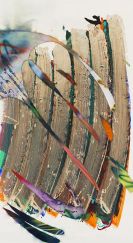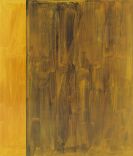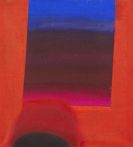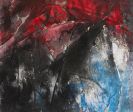
Hans Arp
Straßburg
1886 -
Basel
1966
From 1904 to 1908 Hans Arp studied at the Weimar "Akademie der Schönen Künste" and the Paris "Académie Julian". From 1912 the artist was in direct contact with Picasso, Kandinsky, van Doesburg and other artists, enabling him to experience the development of European avant-garde at first hand and to apply it to his own works. Arp's artistic career was always influenced by his contacts with various groups of artists: He was fascinated in the "Blauer Reiter" in Munich and was a member of the Zurich "Cabaret Voltaire", a circle of artists which brought forth the Dada movement in 1916. His keen interest in surrealism finally lead him to join the group "Abstraction-Création".
First wood reliefs, simultaneous poems and automatic poetry developed from 1917 onward. In Dadaism the artist found an opportunity to create a new art based on the principles of coincidence, automatism and the extension of the subconscious. Arp expressed spontaneity and instinct in biomorphic reliefs (e.g. Plant Hammer) and arbitrarily collated collages. Arp was committed in the Cologne Dada circle and the Paris Dada movement. Arp worked on various publications together with Schwitters.
In April 1917 the artist found his "decisive forms". "At Ascona I drew (...) branches, roots, gass, rocks (...). I simplified these and united their essence in moving oval images of the transformation and the becoming of the body". (Arp).
Hans Arp's aim to depict the continuous transformation of nature with its inner characteristics was first conveyed in reliefs and works on paper, before he discovered round sculptures in 1929, a medium which enabled him to depict growth and decay in soft, flowing, convergent masses.
Hans Arp, who had always been very interested in philosophy and psychology and studied it intensively, achieved a synthesis of Surrealism and Abstraction. Out of protest against the Nazis Arp changed his name from Hans to Jean in 1939.
In the 1950s he received large public commissions, such as the design of a monumental relief at the UNESCO building in Paris. At the Venice Biennale, Hans Arp's sculptures were awarded the "Grand Prize for Sculpture" in 1954 and in 1963 he received the "Grand Prix des Arts" in Paris. On July 7, 1966 the artist died of a heart attack. Jean Arp is considered one of the great discoverers of form in the 20th century, leaving an œuvre of great artistic importance.
Would you like to sell a work by Hans Arp?
Infos for seller











